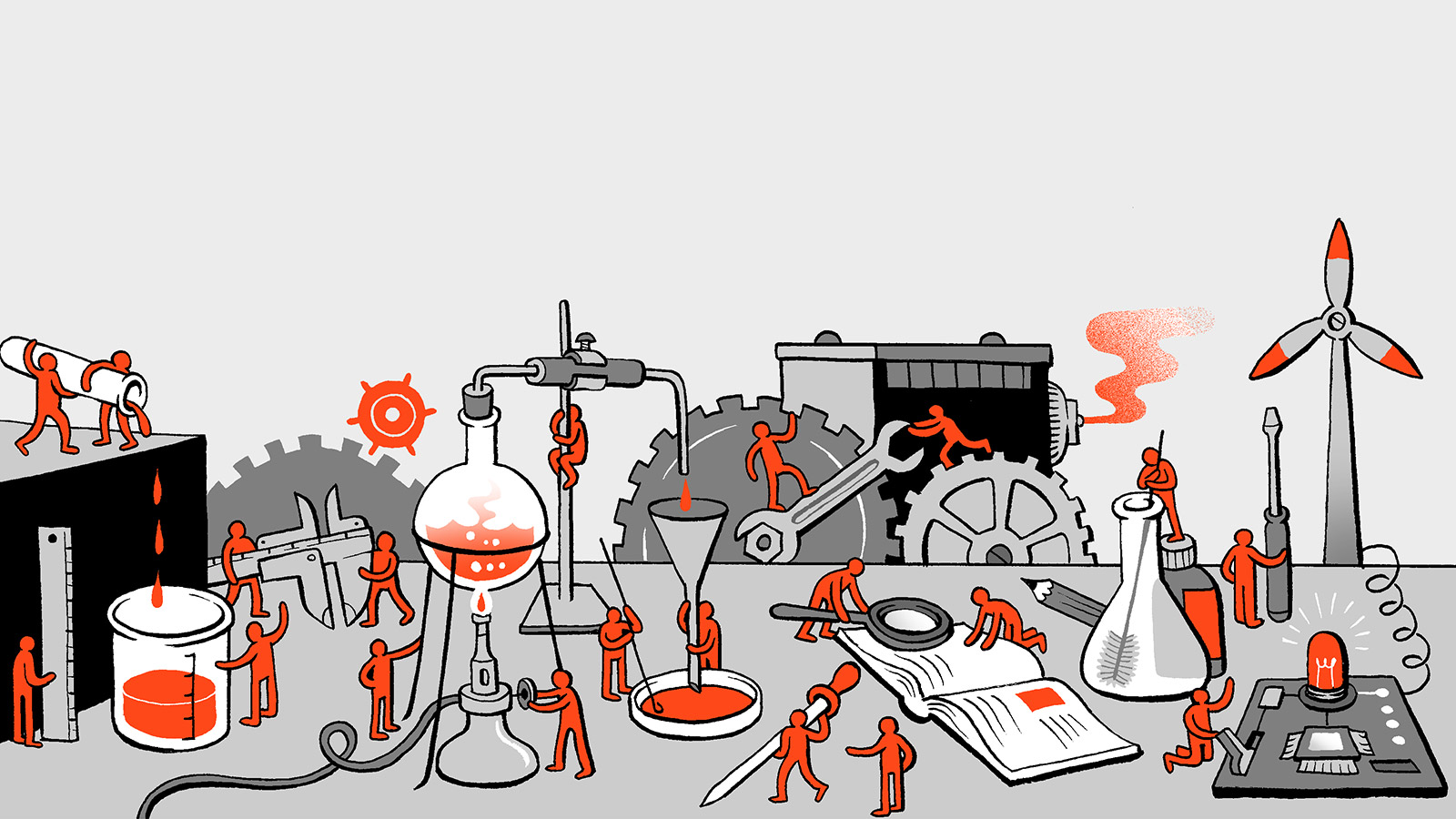Letter from the Editors
Volume 26, no. 2, Ways of Knowing
 As an organization led by STEM workers and educators, Science for the People has a special responsibility to recognize that current, Western, professional science does not have a monopoly on truth nor on the practices through which people create and transmit knowledge. In titling this issue Ways of Knowing, the Editorial Collective seeks to honor the myriad epistemologies generated by diverse cultures through history and around the globe, many of which continue to face ongoing threats of elimination, erasure, and assimilation. This is no simple matter for scientists, and especially for scientists who draw inspiration from Marxism, which has famously adopted a philosophy of science rooted in historical materialism. We have had to confront challenging questions: Do we accept all forms of knowledge as equal, regardless of their attention to empirical evidence? In honoring diverse epistemologies, have we fetishized them? Have we expected them to remain static, denying the dynamic interactions and transformations that all societies experience? Have we failed to recognize that traditional forms of knowledge sometimes uphold oppressive social hierarchies and deserve criticism rather than honor? And when does engagement with diverse epistemologies cross the line into appropriation?
As an organization led by STEM workers and educators, Science for the People has a special responsibility to recognize that current, Western, professional science does not have a monopoly on truth nor on the practices through which people create and transmit knowledge. In titling this issue Ways of Knowing, the Editorial Collective seeks to honor the myriad epistemologies generated by diverse cultures through history and around the globe, many of which continue to face ongoing threats of elimination, erasure, and assimilation. This is no simple matter for scientists, and especially for scientists who draw inspiration from Marxism, which has famously adopted a philosophy of science rooted in historical materialism. We have had to confront challenging questions: Do we accept all forms of knowledge as equal, regardless of their attention to empirical evidence? In honoring diverse epistemologies, have we fetishized them? Have we expected them to remain static, denying the dynamic interactions and transformations that all societies experience? Have we failed to recognize that traditional forms of knowledge sometimes uphold oppressive social hierarchies and deserve criticism rather than honor? And when does engagement with diverse epistemologies cross the line into appropriation?
These questions take on increased relevance when the knowledge in question has been generated and preserved by Indigenous communities. Thus, articles focusing on Indigenous knowledges are especially prominent in this issue. Citing Yásnaya Elena Aguilar Gil, Maya Cohen and Michelle Zhang remind us that the notion of “Indigeneity” is inextricably linked to colonialism; that “Indigeneity” can also be thought of as a political category wielded by colonial powers in order to homogenize the multiple, polyvocal cultures that those powers have controlled, subjugated, and dispossessed of land and culture. Settler colonialism has subjected Indigenous people not only to genocide and land theft, but also to cultural assimilation and epistemic colonialism, that is, the discrediting and attempted elimination of Indigenous ways of knowing. The specific politics of settler colonialism that make the dangers of appropriation particularly acute. Moreover, the connection of Indigenous peoples to their lands—a connection that is almost always spiritual as well as material—challenges us to rethink the ways that have divided the world along Cartesian lines into human/nature, and expands our view on the different forms that a science of the natural world can be articulated or animated. Again, this is not a simple matter, for many scientists, who are trained to accept only material explanations for phenomena.
We begin with a syncretic piece on Indigenous knowledge and personal journey of coming-to-know that was written by four scholar-activists: Pedro Reynolds-Cuellar, Annie Te One, Jacqueline Paul, and Alvin Harvey. Highlighting the importance of cultural knowledge, each researcher reflects on their lived experiences of embodied knowledge in their respective fields, and offers their perspectives on weaving together Indigenous and Western ways of knowing.
The articles in this issue also capture the process of recuperating knowledge by communities who remained rooted in place, and the diversity of methods and practices these communities adopt to survive and adapt with change. The erasure and extermination of peoples and cultures at the hands of imperial violence have also involved the intentional erasure of Indigenous knowledges: the suppression of languages, traditional practices, and the extinction of plants and animals. Even in places where Indigenous cultures and ways of knowing persevere, the intergenerational trauma wrought from the practices of brutal imperialism (e.g., colonial rules prohibiting cultural healing practices) has left deep scars on knowledge systems. In “Sowing Ancestral Futures,” Sara Gutiérrez interviews Yowar Mosquera Rivas, a community organizer and co-founder of Protectores de la Tierra (Earth Protectors), a food sovereignty project In Colombia. In the Chocó department of Pacific lowlands in Colombia. Daily rhythms are determined by the water and alluvial conditions in Nuquí, where Yowar and Sara discuss how local Afro-descendant and Indigenous communities are protecting land, knowledge, and food sovereignty despite climate-related disruptions and conflict.
In “Making Space: Knowing Nature through Anti-Imperialist Struggle in the Philippines,” Jon Bonifacio connects pre-colonial histories and knowledge to the present day by tracing traditional practices used by different rural and urban agrarian movements in the Philippines. Also centering struggles of the Lumad people, Aene Comiling’s article discusses land encroachment, cultural decay, loss of identity, and the sense of mourning that accompanies the destruction of Indigenous ways of knowing driven by a Western-imposed reorientation away from an understanding of seeds as vital and living members of a community towards a view of seeds as inert and lifeless technologies.
While traditional ways of knowing derive some of their power from their deep histories in the place they originated, they are also dynamic with far-reaching influence across space and time. Gwen D’Arcangelis discusses the liberatory uses to which Chinese medical methods and traditions have been adapted by BIPOC social movements and communities in the US. While 1960s activists were inspired by Chairman Mao’s emphasis on cultivating amateur expertise in service to the people, more recently BIPOC communities have resisted the Mao-era erasure of spirituality and engaged in more pluralist forms of medical practice.
Devin Thomas White and Ebony O. McGee present Afrofuturism as a time-transcendent framework for STE(A)M curricula. Embodying Kemetic principles of learning from the past to transform the future, they explore Afrofuturism as a traditional praxis working to empower Black students with skills in futures building and freedom dreaming. They remind us to honor and acknowledge the development of the sciences by the Afrikan diaspora and to continue the work of dismantling white supremacist legacies in STEM fields that exploit and erase Black people.
Of course, Indigenous knowledge is not a monolith. This can make it challenging to transform the myriad Indigenous ways of knowing into a singular set of concrete “demands” for scientists in mainstream institutions looking to decolonize their research or to reconcile their research practices with Indigenous knowledge production. In “Reclaiming Epistemic Diversity: Between Community Struggles and Corporate Capture,” David Ludwig, Fabio Gatti, and Esther Milberg Muñiz critique the shallow, corporatized, and neoliberal pseudo-commitment to “epistemic diversity,” which contrasts sharply with the radical pedagogies of Amílcar Cabral and Paulo Freire, who encouraged educators to “return to the source” and root their teachings in Indigenous and communally-held ways of knowing.
In “Old Contradictions and New Possibilities in Marxist and Indigenous Praxis,” Sigrid Schmalzer and Kavita Philip explore some tensions that exist between those Indigenous ways of knowing which are inseparable from spiritual worldviews and orthodox Marxist commitments to materialism which elevate the liberatory potential of science and its methods. To reconcile these two approaches, the authors draw on examples from leftist Indigenous praxis, seeking a revitalization of a historical materialism that integrates cultural, political, and economic critiques while recognizing that “ways of knowing” are also inseparable from land and labor.
Together, the pieces in this issue open up questions about how to move forward in relation to Indigenous knowledge: How can scientists meaningfully incorporate Indigenous ways of knowing into their practices and worldviews without exploiting or appropriating them? As practitioners of science, how do we make our science relevant to a greater fraction of the world who may be wary or skeptical of claims that Western science is universal and liberating? What are the implications of turning our attention towards “ways of knowing” that have survived ongoing systemic projects of colonization and oppression?
The resilience of Indigenous ways of knowing in the face of violent histories of and present-day colonialism inspires us at a very difficult moment. As this issue goes to press, the genocide against the Palestinian people continues. We are reminded of the Spring 2020 (Vol. 23, no. 1) issue of Science for the People, titled “Science under Occupation,” which included the article, “An Environmental Nakba: The Palestinian Environment Under Israeli Colonization.” In it, Mazin B. Qumsiyeh and Mohammed A. Abusarhan speak of the ways that colonizers “separate the colonized from their land and destroy their culture and history,” and they thus emphasize the importance of “strengthening the connection between the indigenous people and their land… [to] help new generations understand the value of nature beyond the exploitative framework imposed by colonialism.”1 We acknowledge that we have much to learn about Indigenous Palestinian ways of knowing, and that studying the history and ongoing violence of settler colonialism in Palestine will further transform our understanding of the workings of colonialism, both epistemic and material, more generally. In her recent book on the role of agricultural technologies in the colonization of Palestine by successive Ottoman, British, and Israeli regimes, Tamar Novick documents the ways that settler colonists, far from simply replacing spirituality with science, actually “blended” technology and religion, and “how this blending became crucial for seizing control over lands and people.” Novick documents the “disregard for, and the delegitimization and criminalization of, local Palestinian forms of life and knowledge”: even as the colonists “depended on local expertise,” Palestinian ways of knowing their animals and their land “were frequently unrecognized, repeatedly erased from the historical record, and ultimately forgotten.”2 But as the articles in this issue demonstrate, what has been erased and repressed can often be recovered and expanded upon in a liberatory path. The preservation and mobilization of Indigenous ways of knowing represent and are important forms of resistance against colonialism and can and have helped chart pathways for revolutionary praxis.
—Volume 26, no. 2 editorial collective
— We will be posting articles online on a rolling basis. Subscribe today to read the issue in full! —
Notes
- Mazin B. Qumsiyeh and Mohammed A. Abusarhan, “An Environmental Nakba: The Palestinian Environment Under Israeli Colonization,” Science for the People 23, no. 1 (Spring, 2020), 2020.
- Tamar Novick, Milk and Honey: Technologies of Plenty in the Making of a Holy Land (Cambridge: MIT Press, 2023), 9, 4.




